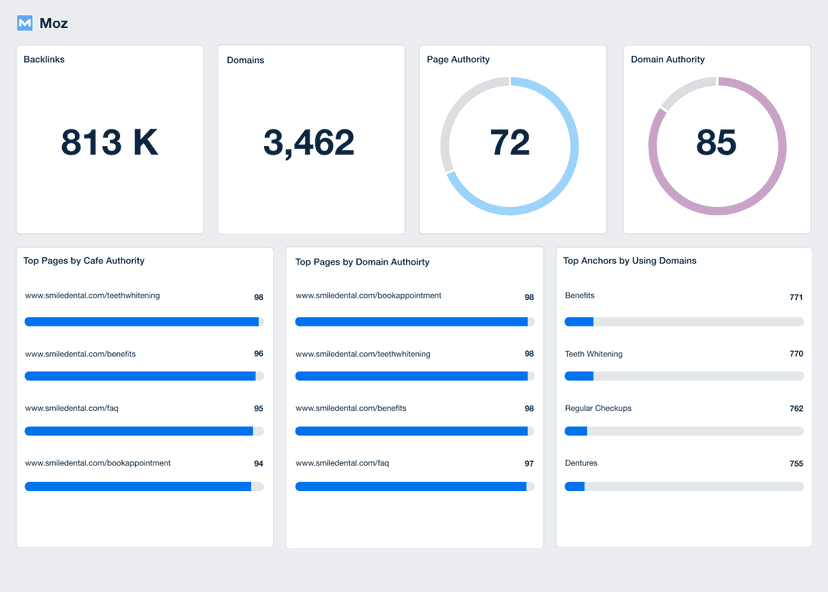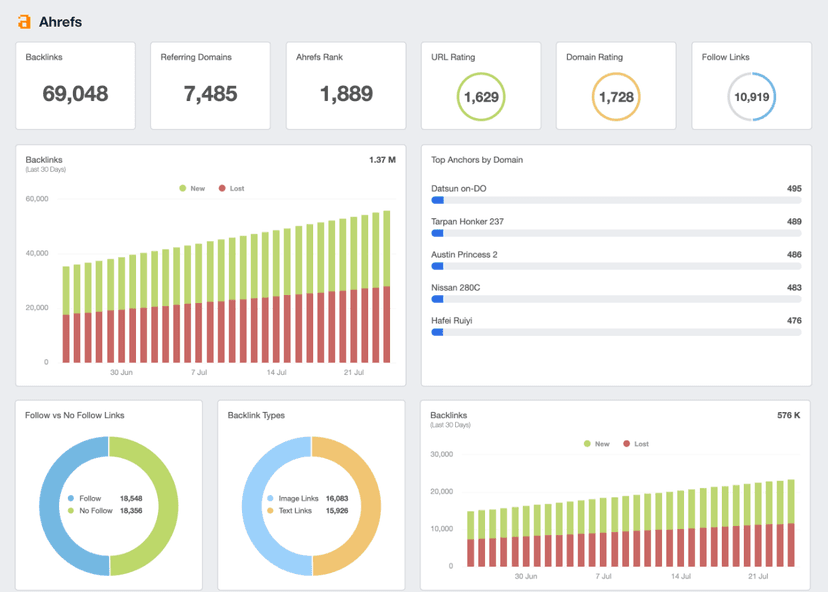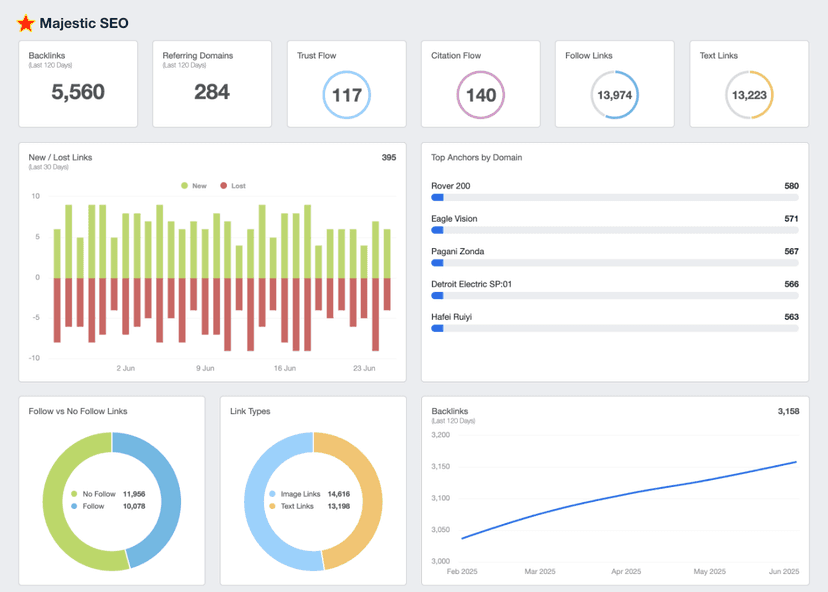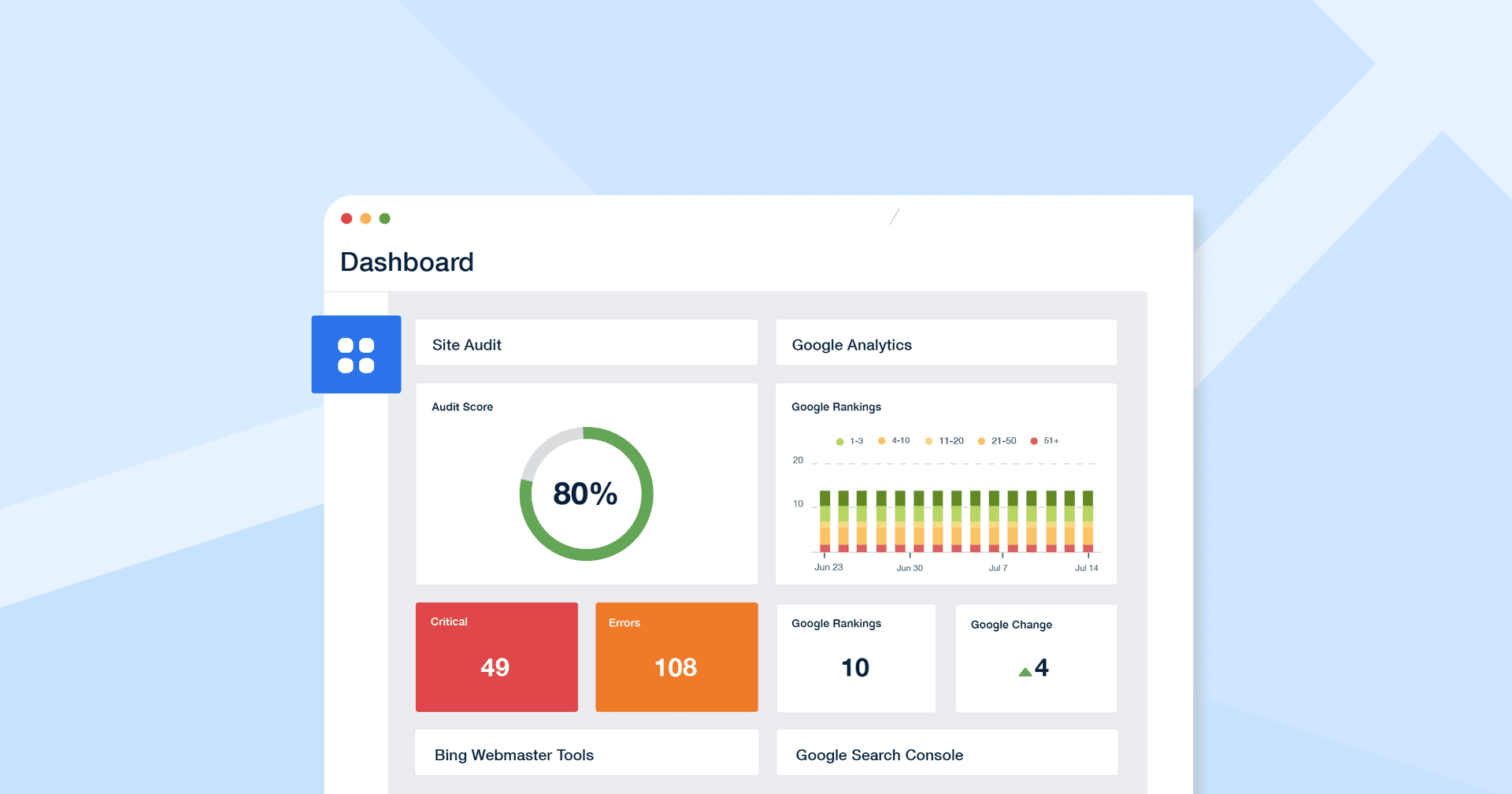Authority Score
Backlink Quality
Assess the trustworthiness, relevance, and credibility of websites that link to a domain.
Competitor Analysis
Compare the authority of competing domains to identify strengths and weaknesses.
Content Optimization
Identify high-authority pages to inform content updates, repurposing, and promotions.
Outreach Targeting
Prioritize outreach efforts to acquire links from relevant, high-authority domains.
Why Authority Score Is Important
Authority Score serves as an essential data point for evaluating a website's overall quality and SEO strength. It’s a metric developed by Semrush, though similar versions exist through other SEO tools like Moz Domain Authority and Ahrefs Website Authority. Essentially, Authority Score is a reliable benchmark to compare the site with competitors, gauge the effectiveness of SEO efforts, predict SEO performance, and monitor improvements over time.
A higher Authority Score reflects strong backlinks and better site credibility, which can boost search engine rankings. This is especially valuable in link-building strategies since a favorable score indicates that backlinks come from reputable, authoritative sources.
This metric is also beneficial when forming online partnerships. A website with a high score demonstrates site credibility, creating a more solid foundation for fruitful collaborations. Additionally, by tracking this score, SEO efforts are prioritized more efficiently, ensuring that websites with lower authority receive necessary improvements.

Stop Wasting Time on Manual Reports... Get SEO Insights Faster With AgencyAnalytics
How Authority Score Relates To Other KPIs
Authority Score plays a vital role in understanding a website's SEO health and is closely tied to other key performance indicators (KPIs). For instance, a high domain Authority Score often correlates with increased organic traffic. That’s because search engines rank content higher, which drives more visibility and clicks.
This number is also connected to a site’s backlink profile, as it reflects the quality and quantity of backlinks. In turn, this further impacts search ranking and Page Authority. A stronger Authority Score also improves keyword rankings, giving a site a better chance to rank for competitive terms and possibly get more traffic.
Beyond SEO rankings, Authority Score also signals the likelihood of higher user engagement. A site with valuable content will typically experience lower Bounce Rates and higher time-on-page metrics. Authority Score also indirectly relates to technical performance metrics such as Page Load Speed and Google’s Core Web Vitals.

Key Factors That Impact Authority Score
Authority Score is shaped by several key factors, starting with the quality and quantity of backlinks. High-quality links from reputable sites carry more weight; having a diverse backlink profile also signals greater authority.
Domain age plays a role, as older sites are seen as more trustworthy. Additionally, Organic Traffic contributes to a higher score since search engines view popular sites as more valuable. Social signals–such as likes and shares–drive visibility and indirectly impact website authority.
Too many referring domains with an identical backlink profile may negatively impact authority metrics. That’s because many search engines prefer diverse and high-quality linking domains. A varied backlink profile is an important Google ranking factor, so it’s essential to regularly assess backlink analytics.
Finally, site security (HTTPS) and technical SEO, including good structure and fast load times, ensure a better user experience. Together, these factors help maintain a strong Authority Score and boost a website’s credibility.

How To Calculate Authority Score
SEO platforms like Semrush provide proprietary algorithms and machine learning to calculate this compound metric. While it’s difficult to calculate manually, it’s helpful to understand how it works.
First, the quality and quantity of backlinks are analyzed, giving higher link power to authoritative and relevant websites. The domain’s organic search traffic is also considered, assessing how much traffic comes from high-ranking keywords. Another critical component is link profile health, which evaluates potential spam indicators like toxic or unnatural backlink patterns.
Semrush Authority Score Formula Example
What Is a Good Authority Score?
A good Authority Score depends on the industry and competition. Generally speaking, though, a score between 40 and 60 is considered solid. It indicates a well-established site with a strong backlink profile and consistent traffic.
Authority Scores above 60 reflect strong credibility, while 80+ signifies an excellent, highly authoritative site.
What Is a Low Authority Score?
A lower Authority Score typically falls below 10, often indicating questionable credibility. This usually reflects new, small, or poorly optimized websites with minimal backlinks, low traffic, or possible spam signals.
Although websites with an authority score between 11 and 20 may still reach a niche or regional target audience, websites with scores in this range often struggle to rank well in search results outside of their niche or local region. Significant SEO improvements are likely needed to improve the website’s authority (e.g., more relevant content).
How To Set Authority Score Benchmarks and Goals
To create Authority Score benchmarks and goals, start by analyzing other websites, especially competitors in the same niche. Establish short-term goals, like increasing this score by 5 to 10 points. Also, choose a realistic timeframe to see results, like allowing 3 to 6 months to acquire high-quality backlinks and increase domain authority.
For long-term goals (e.g., over 6-12 months), aim for a 15 to 20-point increase by strengthening content relevance and referral domains. It’s also a good idea to focus on creating a well-rounded backlink profile. To stay on course, regularly track progress and adjust strategies as needed.
Median Semrush Authority Score for SMB Campaigns
The median Semrush Authority Score currently sits at 14, based on performance benchmarks from over {{campaign-count}} campaigns managed by {{customer-count}}+ marketing agencies. This figure reflects the typical range for SMBs, which often have lower authority scores compared to larger enterprises or established brands.
Understanding how a clients Authority Score compares to industry standards helps agencies identify opportunities to strengthen a client’s backlink profile or improve their overall SEO strategy.
Access detailed performance benchmarks and see how campaigns measure up. Get started with a 14-day free trial.
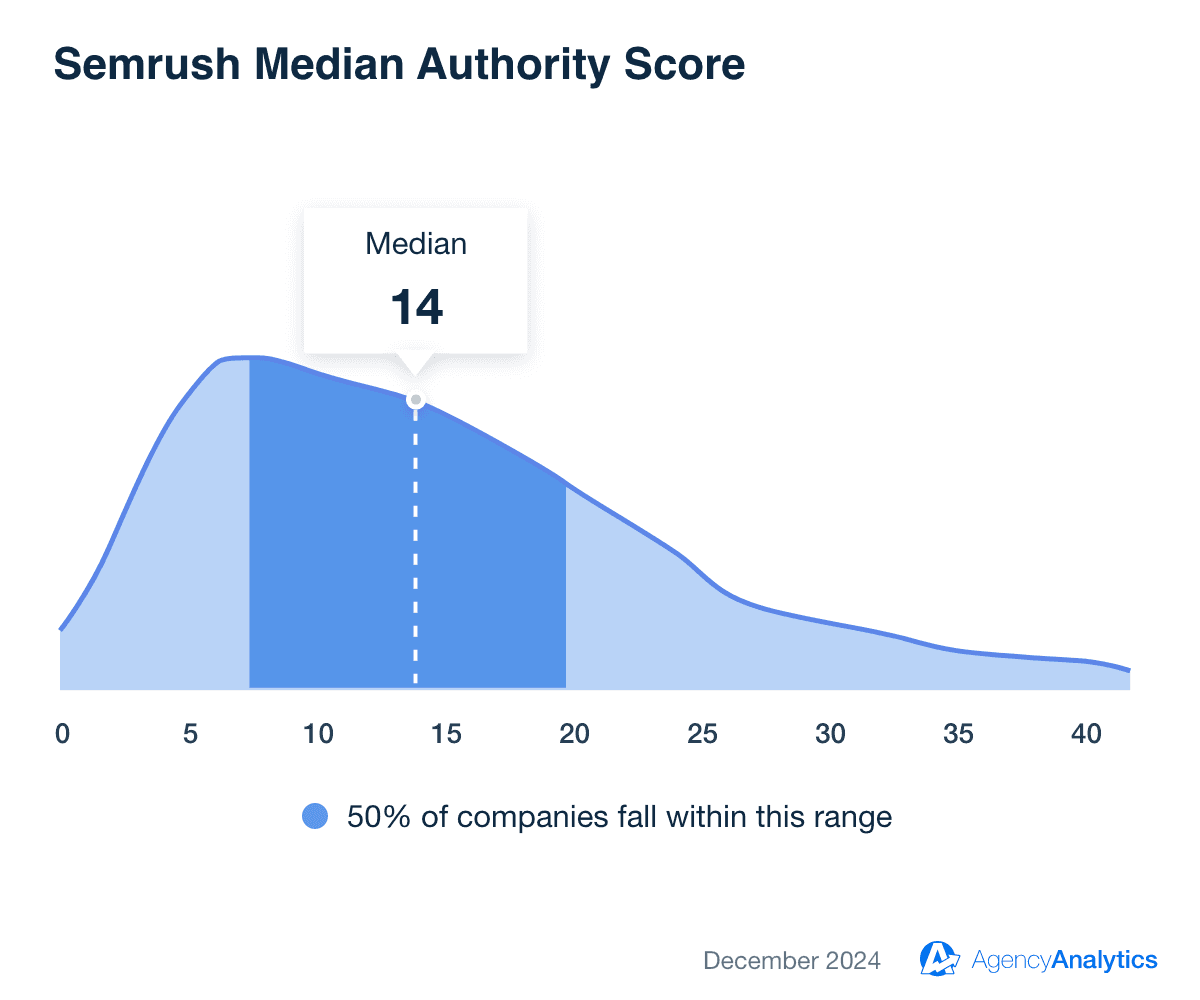
Why Authority Score Matters to Clients
This metric matters to clients because it directly impacts website credibility, search engine ranking score, and online visibility. A higher Authority Score indicates a strong backlink profile, quality content, and a trusted domain. This leads to higher positions on search engine result pages and more organic traffic.
A favorable Authority Score translates to increased brand exposure, higher lead generation, and improved ROI from other marketing efforts. It also shows potential customers that a client’s business is trustworthy, enhancing their overall online presence and competitive standing.

Why Authority Score Matters to Agencies
Authority Score matters to agencies because it helps evaluate and improve a client’s SEO health. A higher score reflects a well-optimized website with strong backlinks and quality content. This helps agencies demonstrate the success of their SEO efforts and show a strong value proposition.
It also enables agencies to benchmark client performance against competitors, set realistic goals, and improve organic rankings.

Discover the Client Reporting Platform Trusted by Over {{customer-count}} Marketing Agencies
Best Practices When Analyzing and Reporting on Authority Score
When reporting on Authority Score, it's important to follow best practices that provide meaningful insights to clients. Here are a few ways to present meaningful data, offer context, and create actionable recommendations.
Ensure Data Accuracy
Verify the accuracy of Authority Score data by using trusted SEO tools, which ensures metrics are correctly tracked.
Analyze Over Time
Track Authority Score regularly to observe long-term trends rather than focusing on short-term fluctuations.
Put in Context
Always contextualize Authority Score by comparing it to industry benchmarks, competitors, and historical performance.
Align to Client Goals
Explain how Authority Score aligns with a client's overall business objectives (e.g., increasing brand visibility).
Visualize Performance
Use clear, engaging graphs to present Authority Score trends and easy-to-understand data.
Include Recommendations
Provide clients with actionable insights on how to improve their Authority Score (e.g., acquiring high-quality backlinks).
We don’t just hand over reports; we put a spotlight on the key performance indicators (KPIs) that matter most to our clients, showcased prominently with their goals in mind. Each KPI gets its own stage, making it effortless for our clients to follow their journey.
FAQs About Authority Score for SEO Growth
Still have questions about how Authority Score works? These FAQs explain what drives it, how to track changes, and how marketing agencies use authority metrics to improve SEO performance, build a natural profile, and prove trustworthiness across client sites.
Domain Rating (Ahrefs), Domain Authority (Moz), and Authority Score (Semrush) are comparative metrics that measure website authority. While each uses different signals, they all reflect how authoritative a domain is based on backlink data and other authority metrics. Authority Score, for example, factors in dofollow domains, organic traffic trends, and spam factors using machine learning to assess overall quality and SEO performance. No single score is absolute—but all serve as benchmarks to track authority over time.
Authority Score is driven by the quality, quantity, and diversity of referring domains. It evaluates link power, the natural link profile, presence of authoritative domains, and any signs of link manipulation like too many referring domains from the same IP network. Factors like backlink strength and the presence of spam factors are also weighted. Machine learning then analyzes these to generate a final score reflecting the domain’s trustworthiness and influence.
Authority Score serves as a quick way to prove trustworthiness to clients and improve rankings through smarter link strategies.
Benchmark a domain’s authority against similar websites.
Prioritize link building from authoritative domains.
Track progress from ongoing backlink audit efforts.
Identify domains with unnaturally high authority metrics or spam factors.
Monitor improvements in Authority Score to evaluate SEO performance over time.
Authority Score uses a logarithmic scale, so each increase reflects significantly more link power and organic traffic. Scores may appear unnaturally high due to spam factors like many backlinks from the same IP address or an imbalance between links and content. A brand new website may have a low score simply because it hasn’t built a natural profile or gained authority measures yet. Comparing to similar websites helps provide context. For the highest Authority Scores, focus on quality—not quantity—of referring domains.
Metrics that reflect overall quality and SEO performance include the total number of dofollow domains (those without a nofollow attribute), the ratio of unique root domains, balance of outgoing links, and the presence of niche-relevant backlinks. A great backlink profile combines natural link profiles with link power and organic traffic growth. Authority Score surfaces these metrics, helping agencies assess whether a domain’s strength comes from real value or artificial signals.
Authority Score updates continuously as new backlink data becomes available, but meaningful changes take time. For established domains, it may take several weeks or months of consistent link building to see measurable gains. For brand new websites, early improvements can happen faster—but only with a natural link profile from authoritative domains. Factors like spam signals, the presence of another domain on the same IP network, or heavy signs of manipulation can delay progress or cause score drops.
Tracking the Semrush Authority Score helps agencies pinpoint whether link building efforts are improving a client's website authority and boosting organic rankings on SERPs. Higher scores indicate improved trust with search engines, making it easier for pages to rank. Comparing authority scores across domains also reveals gaps in link profile quality and opportunities to build stronger authority with fewer, more valuable links.
Authority Score is part of Semrush’s backlink analytics toolset, which includes limited access via a free tool. While a free account gives a snapshot, full access to backlink data and SEO features requires a paid plan. For client reporting, professional tools like AgencyAnalytics let you monitor Authority Scores at scale and share insights clearly with your team and clients.
Semrush Dashboard Example
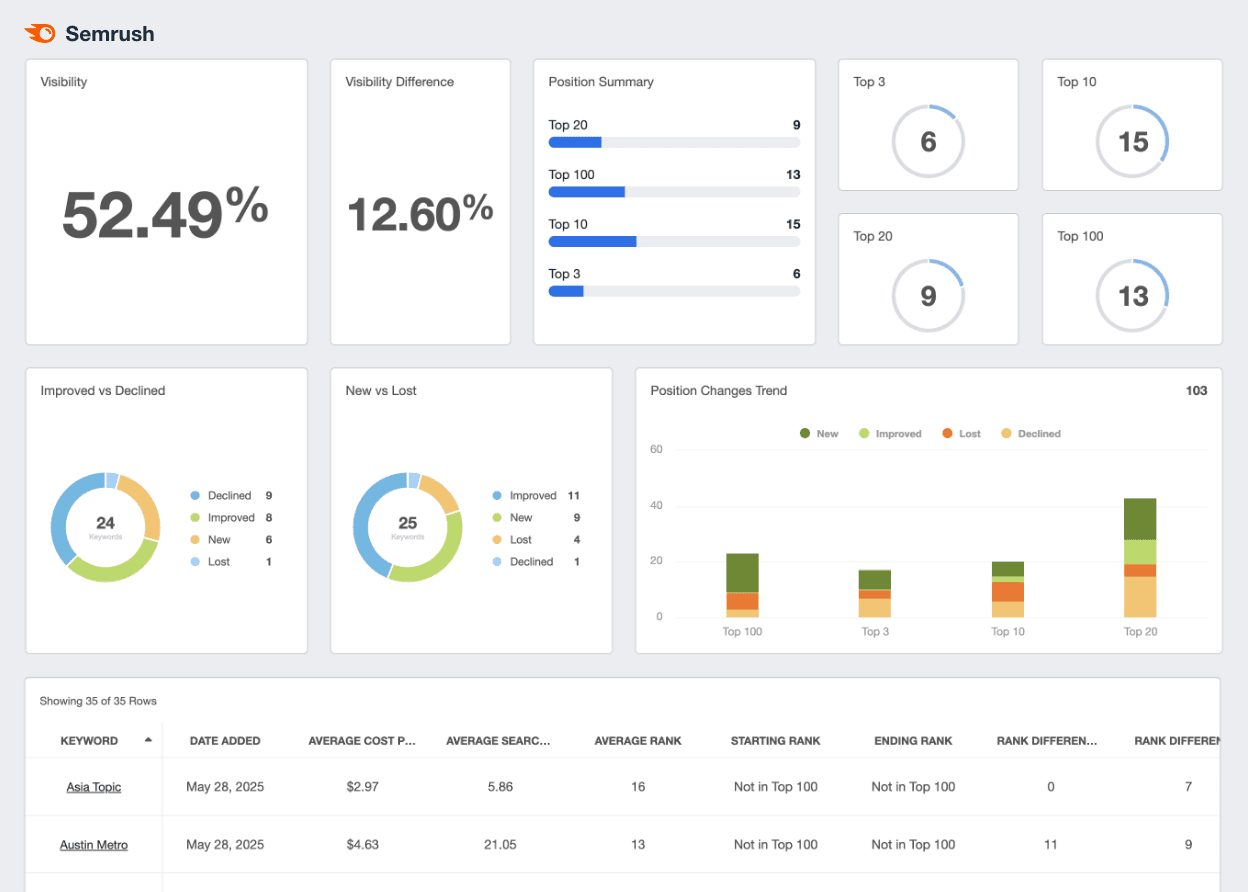
Related Integrations
How To Improve Authority Score
Improving Authority Score takes time and consistent effort. While there's no one-size-fits-all approach, focusing on a few key strategies will make a significant impact.
Build High-Quality Backlinks
Focus on acquiring more backlinks from authoritative websites. Use tactics like guest blogging, partnerships, and consistent content creation.
Optimize Content for SEO
Ensure content is well-optimized with relevant keywords, high-quality information, and a strong internal linking structure.
Disavow Toxic Links
Monitor backlink data and look for low-quality links. Quickly remove or disavow harmful links that could have a negative impact.
Related Blog Posts
See how 7,000+ marketing agencies help clients win
Free 14-day trial. No credit card required.


